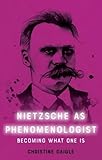Nietzsche as Phenomenologist / Christine Daigle.
Material type: TextPublisher: Edinburgh : Edinburgh University Press, [2022]Copyright date: ©2021Description: 1 online resource (208 p.)Content type:
TextPublisher: Edinburgh : Edinburgh University Press, [2022]Copyright date: ©2021Description: 1 online resource (208 p.)Content type: - 9781474487849
- 9781474487870
- 193 23
- online - DeGruyter
| Item type | Current library | Call number | URL | Status | Notes | Barcode | |
|---|---|---|---|---|---|---|---|
 eBook
eBook
|
Biblioteca "Angelicum" Pont. Univ. S.Tommaso d'Aquino Nuvola online | online - DeGruyter (Browse shelf(Opens below)) | Online access | Not for loan (Accesso limitato) | Accesso per gli utenti autorizzati / Access for authorized users | (dgr)9781474487870 |
Frontmatter -- Contents -- Preface -- Acknowledgements -- List of Abbreviations -- Introduction: Reading Nietzsche -- 1 Nietzsche’s ‘Wild’ Phenomenology -- 2 Nietzsche’s Phenomenological Notion of the Self -- 3 Multi-layered Embodied Consciousness -- 4 Being-in-the-World—Being-with-Others -- 5 Fettered and Free Spirits -- 6 Becoming Overhuman -- Conclusion: From the Ethical to the Political -- Bibliography -- Index
restricted access online access with authorization star
http://purl.org/coar/access_right/c_16ec
Radically revises Nietzsche’s ethical and political views by controversially interpreting his philosophy as phenomenologicalClosely analyses the often-disregarded middle period works by Nietzsche, including The Gay Science, Daybreak and Human, All Too HumanIncludes a new interpretation of key concepts, such as will to power, to emphasise their phenomenological importEngages with prominent commentators from the continental and analytic tradition including Ruth Abbey, Keith Ansell-Pearson, Rebecca Bamford, Christa Davis Acampora, and Robert C. MinerAdvances new perspectives on central and well-known passages from Nietzsche's corpusChristine Daigle explores Nietzsche’s phenomenological method, a ‘wild phenomenology’, to elucidate his understanding of the human being as an intentional embodied consciousness, as a being-in-the-world and as a being-with-others. Establishing this phenomenological conception of the human allows Daigle to revisit the Nietzschean notions of free spirit and the Overhuman and how they express the ethical and cultural-political flourishing Nietzsche envisions for human beings. This daring reinterpretation of Nietzsche’s philosophy resolves inconsistencies in previous scholarship and offers a thought-provoking new take on his ethical and political views.
Mode of access: Internet via World Wide Web.
In English.
Description based on online resource; title from PDF title page (publisher's Web site, viewed 01. Dez 2022)


